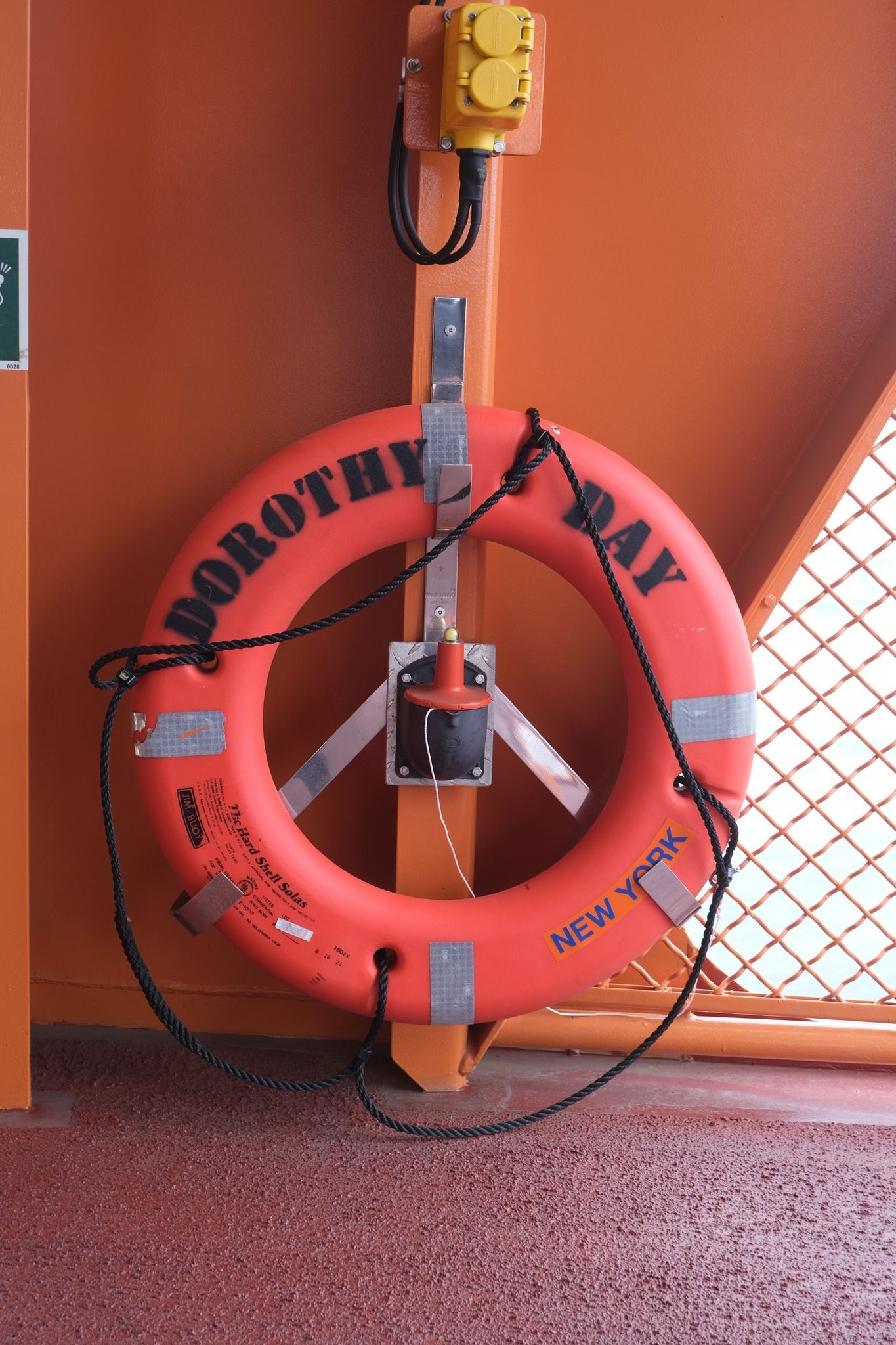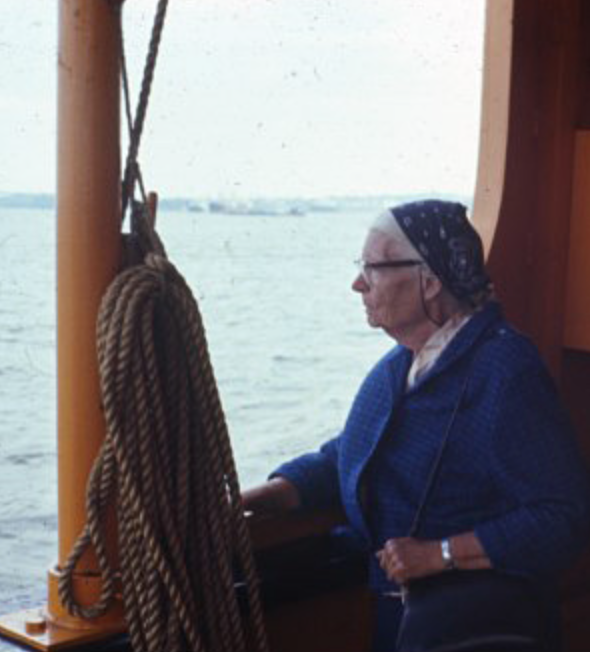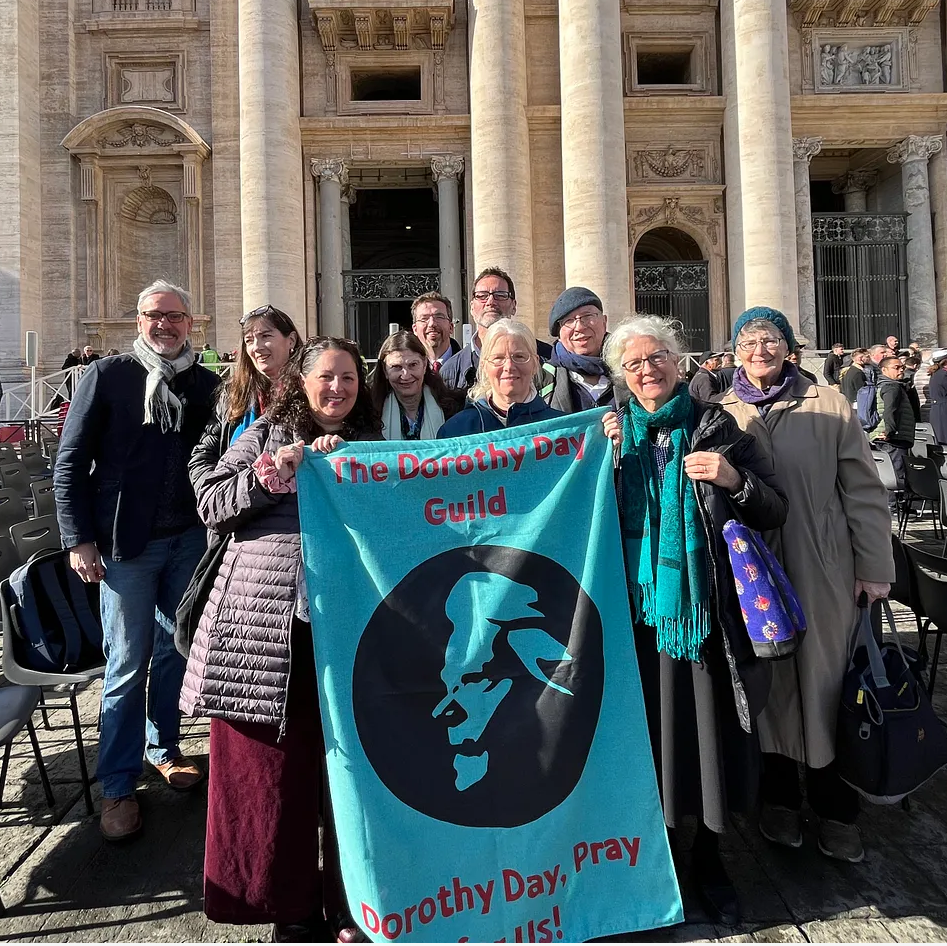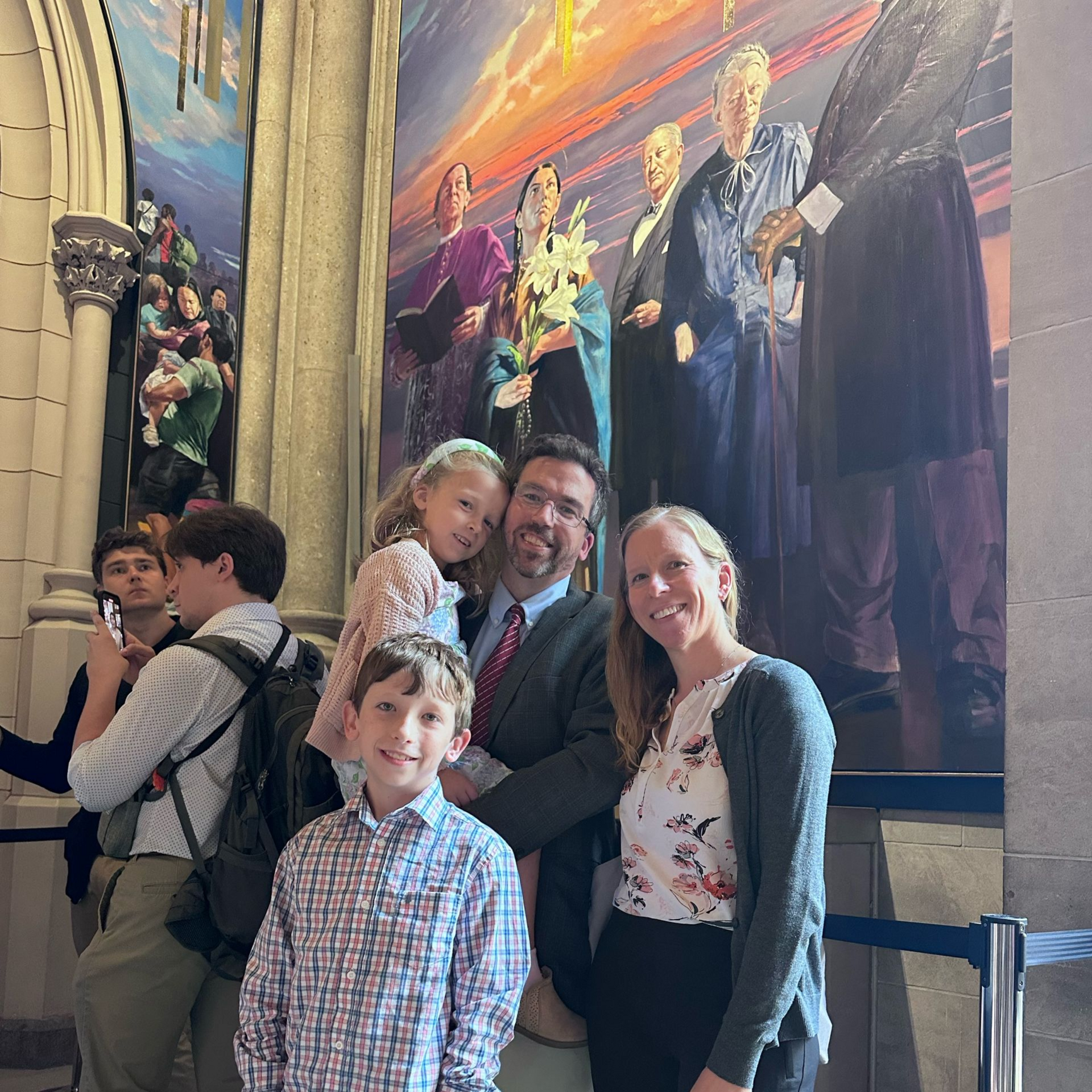‘What would Dorothy Day think of all this?’
We gathered around the speaker’s podium and, as requested, placed our hands on our hearts, pledging allegiance to the flag. This was followed by a genuinely rousing rendition of “The Star-Spangled Banner.” Somewhere around the “rockets’ red glare,” I found myself drifting off and wondering what would Dorothy Day think of all this?
The commissioner said that the true recognition of Dorothy Day required more than taking the ferry: it meant standing up for immigrants and supporting the rights of workers to organize. Bishop O’Hara told us that Dorothy Day was a prophet and that God raises up prophets to disturb the comfortable and comfort the disturbed. I am reminded of the great Jewish theologian Abraham Joshua Heschel who once wrote that the essence of a prophet is “a person who holds God and men in one thought at one time, at all times.”
Coming full circle, Martha Hennessey read a wartime excerpt from her grandmother’s Catholic Worker
column and spoke to our own divisive times. “We may disagree, but we cannot and must not forget the poor.”
It was a moving ceremony that leaves us gently subdued. At its conclusion, we are all invited aboard the Dorothy Day. I overhear someone say that the vessel can actually convey up to 4,500 people. In silence, we shuffle along—communicants walking up the aisle. Fireboats in the harbor like acolytes follow us at a respectful distance, announcing our departure by sending elegant spumes of water into the air.
The interior layout of the boat feels comfortably familiar. It is gleaming and fresh with a sleek coffee bar not yet open for business. I wonder how long it will last before it resembles the ferries of old with clouded windows, sticky floors and the smell of hot dogs. I have travelled those ferries and remember how refreshing it was to stand on deck on a hot day and how crowded it could get onboard on a blustery day. Who knows? A generation from now, someone cramped in the vestibule may idly read the once gleaming plaque about Day and wonder just a little about this Servant of God, this prophet who witnessed the world around her with tireless passion.
As the ferry gets underway, people settle down. Lost in their devices or their headsets, they nod off or look out the window as I do. The steady hum from the ferry engine churning its way through the ocean “vast and spacious and teeming with creatures beyond number” as the psalmist wrote, lends itself to contemplation. I can only imagine the comfort that this ferry ride must have provided for Dorothy who loved the sea, loved Forster when he came into bed smelling of seaweed and salt, and loved returning to Staten Island where her life began in the waters of baptism.
I too find comfort in this ferry ride. I remember one trip vividly. For more than half his life our brother Ron had struggled with serious bouts of depression and mental illness. His identity as a gay man, constricted by a homophobic and often hostile culture, only added to his burdens. My sister and I were determined to celebrate his fiftieth birthday in high spirits on Staten Island where the Philharmonic was offering a free concert at Snug Harbor. Everything was planned in great detail. The only thing we hadn’t planned for was rain. Drenched, we followed the disappointed crowd onto the ferry back to Manhattan. Ron’s labile mood had descended with the weather, muttering to no one in particular, “It always rains on my birthday.”
‘Sometimes—there’s God—so quickly!’
It felt hopeless laying out a picnic on his lap and attempting to be festive. Yet, catastrophe turned to sheer joy. Sensing our dilemma, we were surrounded by a community of well-wishers. People we just met called my brother by his name, chatting and commiserating about the rain. They applauded as my sister, Carolyn, managed to pass a birthday cake with candles still lit through the windows of the ferry and joined us in a chorus of happy birthday. Officials investigating the commotion contributed to the celebration, dimming the runner lights on the upper deck and allowing us to linger onboard as long as we wanted. Even the captain appeared, inviting my brother to visit the wheelhouse and help him steer the ferry into Manhattan. We traveled that ferry back and forth for hours. Yes, hard to believe. But it happened.
That evening my brother was saved by the kindness of strangers, like Blanche DuBois in A Streetcar
Named Desire
:
It was like you suddenly turned on a blinding light on something that had always been half in shadow, that’s how it struck the world for me. Sometimes—there’s God—so quickly!
It’s a blessing to see Christ in the poor and vulnerable. It’s a blessing yet again, to recognize Christ’s love in the actions of others. As Dorothy once commented, we might as well face it—there’s a bit of the saint in all of us.
I’m swept from my reverie with the sound of horns. The ferry is approaching Manhattan. We converge to the exit doors, disembark, trudge along the massive span from ferry to terminal and disperse in all directions to our various destinations. In the merge of people coming and going, I lose sight of anyone I know. The building is a cavern of soaring windows, so different from the terminal Dorothy Day would have remembered. A plate glass view of the Statue of Liberty in the harbor reminds us to welcome the stranger. In this corner of the Manhattan terminal, I see my fellow travelers gathered. Many of them I had met years ago; others I have just met. The guitars are playing and familiar songs are sung; I muse at how many times the individuals in this small group must have borne witness in peaceful demonstration, acts of prayer and non-violent resistance to injustice. There is something so humbling about seeing people as we grow old. The work is never done, I think. Like the workers on the ferry, we are weary before the day has begun.
Yet in that moment I also feel heartened, remembering a passage from William James that Dorothy was fond of quoting:
I am for those tiny, invisible molecular moral forces that work from individual to individual, creeping through the crannies of the world like so many rootlets or like the capillary oozing of water, yet which if you give them time, will rend the hardest monuments of man’s pride.
Music gave way to prayer and I snap to attention. Carolyn has appointed me unofficial bell ringer, and St. Joseph’s Church in Greenwich Village, the same church that once provided late night comfort and solace for a youthful Dorothy Day, has kindly provided a set of “Sanctus” bells, the kind used at the Consecration. They sound the same now as when Dorothy would have heard them, not knowing what was going on at the altar but drawn to its holy mystery.
We give thanks to God for blessing us with good companions—for Peter Maurin who gave Dorothy a synthesis of faith in action that inspires us today, and workers like Joe Zarrella who was as enthusiastic when I met him in the 1980s as he was in the Depression when Dorothy Day first described their meeting. We remember the compassion and sacrifice of lifelong peacemakers like Eileen Egan, and the exuberant energy of political and labor activists like Mike Harrington and John Cort. And those unnamed, but in our hearts, the humble, unspoken saints we’ve met along the way. So many of us, myself included, understand Dorothy more fully through them. Their light continues to guide us.
And so, together and in spirit, we pledge our allegiance to the Beatitudes. With each refrain, the bells echo Christ’s blessings through the ferry terminal: to the merciful, the pure in heart, and the peacemaker.
Afterwards, we meander out into the sunlight.
Upon reflection, a ferry named Dorothy Day
may not be so improbable after all—not a statue or a monument, but a utilitarian boat, sturdy and dependable, offering modest respite, time to reflect, and free transport for workers on their daily journey. Yes, from what I know of Dorothy, I think she would approve.
And godspeed, the Dorothy Day
, on all her journeys.








